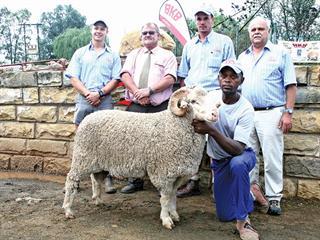However, according to Clover Producers’ Forum chairperson Nigel Smith, producers are in “an ideal scenario”. “We’re in such a strong position we can afford to list and grow the company substantially without losing control,” he explained. “The important thing for producers to understand is we can’t just be invested in the primary industry.
“We should also be invested in the secondary industry, and, ideally, in retail too. So wherever the money is being made, we are making it. We don’t want to put all our eggs in one basket." Maintaining a controlling stake in the producer-owned company is non-negotiable, added Smith.
Currently, management holds a 15,4% stake in the business, with the Clover Milk Producers Trust holding 16,3% and producers owning 68,3%. However, with shares being split in half to make more available for the listing, there will be some dilution of these figures.
The Clover Milk Producers Trust was set up to hold producers shares and to purchase more shares to maintain their controlling stake. “The idea is that we will continue to purchase shares as producers, sell them and use dividends to purchase further shares to grow that share capital,” explained Smith.
Nothing will be finalised, though, until they have an idea of the number of shares and what the dilution is. Clover hopes to raise between R500 million and R570 million from the sale of about 47 million new shares on the JSE after it lists on 14 December. Shares are being made available to selected institutions, management and existing shareholders in deals worth R100 000 or more.
Clover has not yet decided how many shares they’ll put onto the stock exchange, but the shares should trade at between R9 and R12.
CEO Johann Vorster said the listing will be of “enormous benefit” to producers in terms of unlocking the value of their shares. "Their shares were worth 10c on 30 May. We have unlocked that and the last trade (under the old share structure) was about R20/share. “Producers were also limited in terms of growth – they couldn’t grow because we couldn’t grow. In a high inflationary environment, the only real way to counter that is to have more volume coming through facilities. Growth is important to us for the same reason it’s important to our producers.”
Many producers, added Vorster, “are youngsters who are highly qualified and are successful businessmen in their own right. They support and understand the value of growth.”Capital raised from the listing will be used to implement value-enhancing capital projects, such as Project Cielo Blu (Blue Sky), which will consume about R350 million of the capital raised.
About R150 million has been allocated to pay for legal and listing costs and to reduce debt. The balance will be used for acquisition opportunities and buying out minority partners in some of Clover’s subsidiaries.
Cielo Blu seeks to relocate production facilities closer to milk sources to reduce distribution and related costs, as well as to expand the capacity of key distribution centres and warehouses to support current and future growth. Vorster said the Mayfair beverages production facility would be dismantled and moved to the Clayville UHT facility in Gauteng, while the UHT facilities would be moved to Pinetown (near Durban) and Port Elizabeth.
This will save on transport costs and “address almost all the historical problems in the supply chain.”Further savings will be made by an improved distribution efficiency through reduced network congestion and offloading constraints, less complex stock management and stock replenishment planning, and the ability to provide required service level to principals on current and future volumes.









